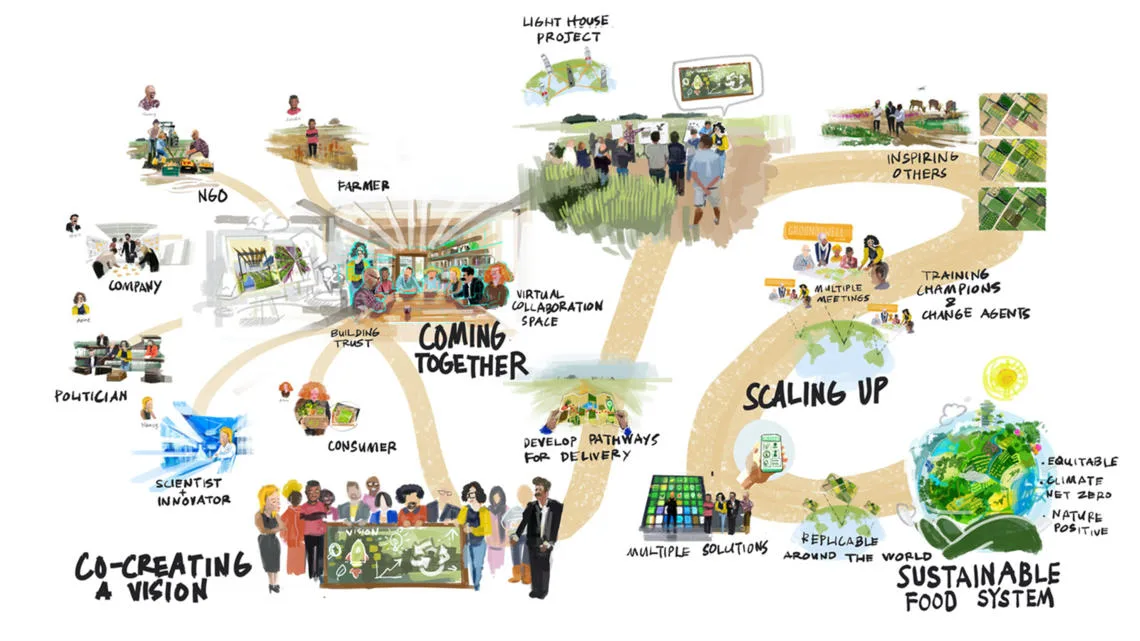Authors
Eike Sindlinger, Tony Siantonas
We have a historical opportunity to transition our farming system to one that achieves positive outcomes for climate, nature and people, say Tony Siantonas and Eike Sindlinger.
Food is core to our past and present
Food needs no introduction. The nutrition it provides sustains humanity. While food shapes us, the way we feed ourselves has, in turn, shaped our world. The invention of agriculture and subsequent agricultural revolutions made it possible for people to shift from nomadic groups to more fixed settlements, enabling radical changes for humanity, including new cultures, entire civilizations and the significant growth of the global human population.
But looking at today’s food system, it is almost impossible to avoid stories about how we are eating unhealthily, farming wrong, and have created destructive technologies across mis-matched supply chains. Just eating breakfast feels fraught with damage: our food system is responsible for one third of global GHG emissions, the majority of biodiversity loss, and holds 70 percent of the world’s poor and malnourished. Dwell too long on facts like this over your morning coffee, and you might prefer to head back to bed and hide under the covers.
A positive vision for our food future
What we need is a positive vision for our food system to unite us in transformative change towards a sustainable future – one where we produce enough food for 9+ billion people to live well, within planetary boundaries, by 2050. We also need simple entry points to cut through the cross-cutting complexity of food and advance its vast scale of potential. In WBCSD’s Vision2050 report, we identified these as climate, nature and inequality.
So head back to breakfast and think of its potential. Martin Luther King Jr said, “Before you finish eating breakfast in the morning, you’ve depended on more than half of the world”. The exciting thing is that our interconnected food system is uniquely positioned to generate a net positive impact for climate, nature, and people: Farms have serious potential to uses their forests and soils as a net sink for GHGs, and can be a host to and regenerator of biodiversity. Rural farming communities provide a social safety net to 500 million family farms, as proven one of the largest migrations ever seen – some 32 million people – during the first wave of Covid-19 lockdowns in India. No other sector can lay claim to such positive potential to a sustainable future.
This also presents an extraordinary future for farming as it clearly identifies agriculture as a central part of the solution. But if we are to have a real chance of meeting this transformation, we have eight harvests to reach a tipping point. We have to accelerate change so that by 2030 agriculture can provide abundant nutritious food for all, reverse nature loss, tackle climate change, and rebuild rural resilience and equality.
This type of scale and speed requires collective global leadership for a decade of agricultural transformation, which we must build up on. In 2021 at the UN Food Systems Summit, global leaders, government representatives and heads of state collaborated to advance and accelerate over 2000 solutions for the first time, and committed to accelerating country-level action tracks. We also saw new 2030 agriculture-related commitments on methane and forest conservation at the UN COP26 Climate Summit.
A grass roots movement of change-maker farmers
To achieve this future vision, we need positive, radical collaboration at scale, using every means at our disposal to build bridges between all food system actors. For those tirelessly working the land, the current food system is a great example where millions of rural farmers and their communities depend on a fair transition. They are the real change-makers upon whom we depend.
We need new initiatives and solutions to engage a movement of farmers and leverage their ingenuity, hard work and sheer numbers to tip the system balance to new visions. It is encouraging that farmers across the world are already sharing and engaging in transformation, from soil health action in Ohio, US to youth agri-preneurs in South Africa.
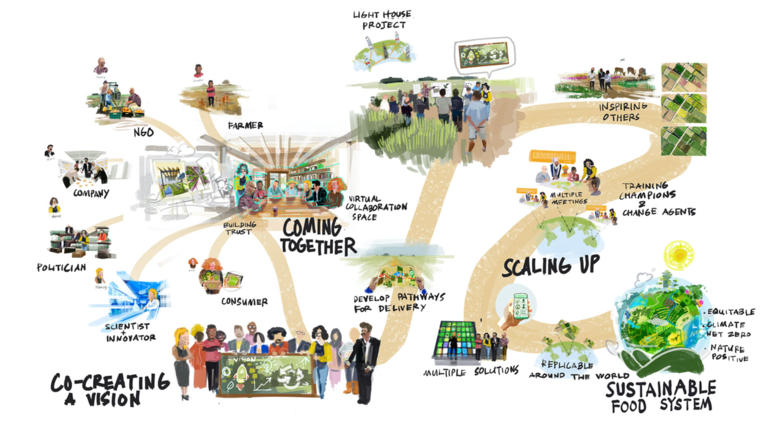
Our story envisions the process through which we collectively nurture and facilitate the radical collaboration needed to enable pathways towards a positive future of food.
New and exciting solutions are also emerging to deliver positive ideas for collective numbers of farmers. Initiatives like Regen10, Climakers, Just Rural Transition and 100m Farmers have put farmers at the heart of delivering climate- and nature-positive agricultural solutions globally. These initiatives are designed to identify the innovations, practices and communities needed for real outcomes at scale, by engaging farmers alongside diverse stakeholders, including everyday citizens, public servants, companies and NGOs.
The aim here is that farmers are engaged and included to provide and adopt ideas as change-makers, along with citizens making good food choices for sustainability and health. We need muddy boots at the same table as people who wear suits, working together to create a shared vision, to co-develop tailored solutions, and to identify the action pathways.
The power of stories and innovative design
By combining WBCSD’s ability to bring these players together and the imagination for innovative and sustainable design from Arup, one of WBCSD’s members, we can bridge the trust gap by creating shared spaces to meet as equals. We believe there is an important role to be played in developing food-positive visions through the power of design thinking and illustration, and have shared in this article a beautiful story-board to connect farmers and global citizens, inspiring everyone to take an active role in food-positive futures.
There is also important work needed to create a blueprint for scaling the kind of agriculture we think possible. Take for example the exciting idea of regenerative farms giving back more than they take. Using the same Vision2050 entry points, we can design for a ‘climate positive’ farm that absorbs more carbon than it emits, or a ‘nature positive’ farm that regenerates biodiversity. We can then overlay these individual solutions for a blueprint to ‘net positive’ farming, along with the incentives needed to scale ambitions.
We also think that immersive new technologies like virtual reality and the metaverse have huge potential to build bridges, by visualizing the outcomes and creating inclusive dialogue spaces for all to hear, participate as equals and build trust. These immersive technologies also provide exciting ways to build and accelerate equitable innovations through the lens of different food system actors. Not everyone has access however, so traditional means of connecting also remain essential to scaling.
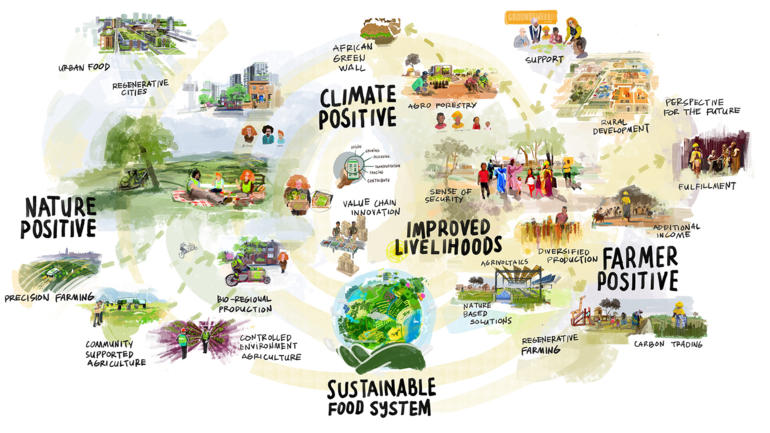
One positive vision for the future of our food system, projected some two decades into the future.
Creating a food systems movement
There is no doubt that the food system is extremely nuanced and complicated. Transforming a network of differing sectors, regions, climates, cultures, processes, techniques, and consumer preferences will be no mean feat. It requires hearts and minds to come together and rally behind a common set of outcomes and develop a shared blueprint for the future of farming. But we are seeing already the seeds of hope, based on strong but simpler visions and coalitions of the willing.
Our ideas offer only just one possible future vision when there are many, requiring us to engage as many food system actors as possible to present and enhance our solutions. Our aim is to find the like-minded to co-create multiple blueprints for the sustainable future of food.
Looking towards COP27 in late 2022, we can’t wait to see where our work will go and will continue collaborating with thought leaders to embark on the road to transformation.
If you are interested to join us on this journey in shaping the positive future of food, please reach out to us using the details below:
Tony Siantonas, Director Scaling Positive Agriculture, WBCSD
Siantonas@wbcsd.org
Tony works at the World Business Council for Sustainable Development (WBCSD) where he leads sustainable agricultural initiatives to address climate change, healthy soils, land restoration, finance mobilization and innovation. Based in Norway on his family’s organic dairy farm, Tony is passionate that agriculture and farming are used and scaled as positive solutions for the climate and nature crises, equitable rural livelihoods, and nutrition security.
Eike Sindlinger, Global Leader Food & Agriculture, Arup
eike.sindlinger@arup.com
Eike is Arup’s global leader for Food and Agriculture Systems. His focus is on accelerating the just transition to resilient and equitable food systems that provide healthy food for everyone and support the biosphere of a thriving planet. From his base in London, he is leading the development of new approaches to urban farming, decarbonizing our food system, enhancing food resilience and making food the ultimate circular resource. He is now collaborating with like-minded individuals, businesses and organizations to create an exciting future for food systems.
WBCSD news articles and insights may be republished in accordance with the Creative Commons Attribution-NonCommercial-NoDerivatives 4.0 International Public License, and in accordance with our Privacy Policy. All Content must be featured with due credits.
Outline
Related
Content
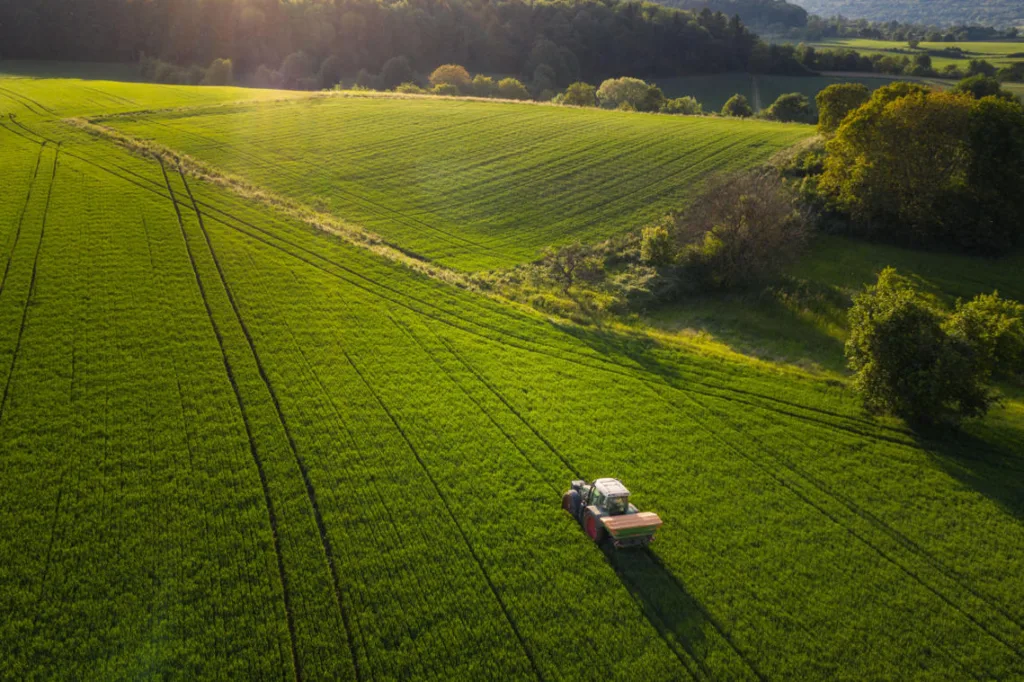
The future of food – How Kraft Heinz is working toward and contributing to a more sustainable food system
17 October, 2023
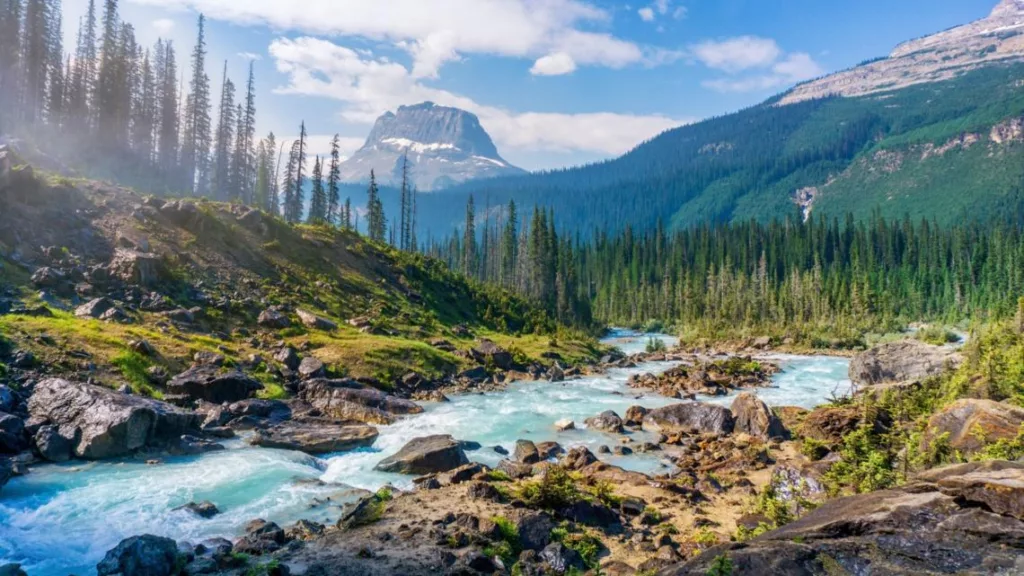
Every sector must play their part in contributing towards a nature-positive future. Here’s how
12 September, 2023
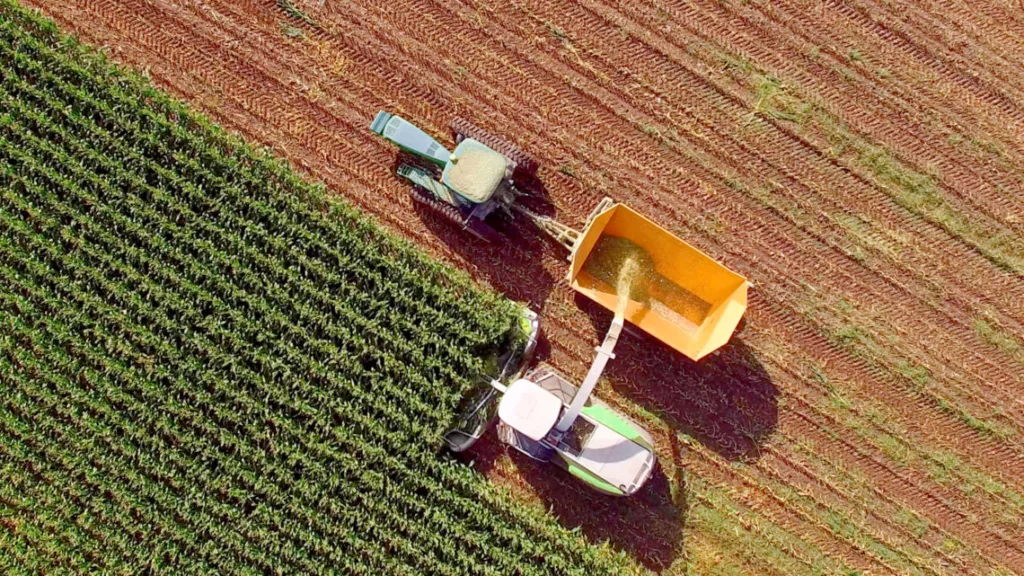
Roadmaps to nature-positive: what’s next for agri-food companies?
12 June, 2023
